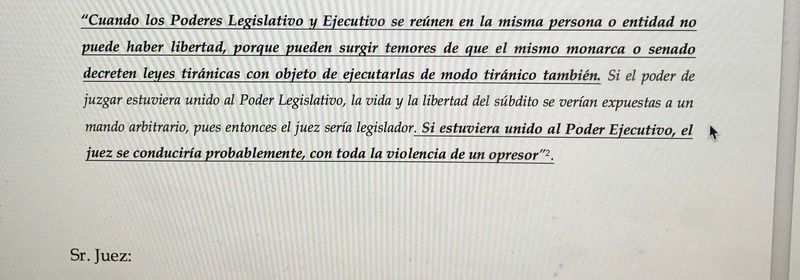I am copying herein the relevant text from
Federalist № 47. Capital text is in the original. Italicized text is that Bajo quoted. Bolded text is what Madison wrote concerning the same.
Read for yourself. And ask yourself why on earth is bajo quoting this.
The British Constitution was to Montesquieu what Homer has been to the didactic writers on epic poetry. As the latter have considered the work of the immortal bard as the perfect model from which the principles and rules of the epic art were to be drawn, and by which all similar works were to be judged, so this great political critic appears to have viewed the Constitution of England as the standard, or to use his own exp<b></b>ression, as the mirror of political liberty; and to have delivered, in the form of elementary truths, the several characteristic principles of that particular system. That we may be sure, then, not to mistake his meaning in this case, let us recur to the source from which the maxim was drawn.
On the slightest view of the British Constitution, we must perceive that the legislative, executive, and judiciary departments are by no means totally separate and distinct from each other. The executive magistrate forms an integral part of the legislative authority. He alone has the prerogative of making treaties with foreign sovereigns, which, when made, have, under certain limitations, the force of legislative acts. All the members of the judiciary department are appointed by him, can be removed by him on the address of the two Houses of Parliament, and form, when he pleases to consult them, one of his constitutional councils. One branch of the legislative department forms also a great constitutional council to the executive chief, as, on another hand, it is the sole depositary of judicial power in cases of impeachment, and is invested with the supreme appellate jurisdiction in all other cases. The judges, again, are so far connected with the legislative department as often to attend and participate in its deliberations, though not admitted to a legislative vote.
From these facts, by which Montesquieu was guided, it may clearly be inferred that, in saying "There can be no liberty where the legislative and executive powers are united in the same person, or body of magistrates," or, "if the power of judging be not separated from the legislative and executive powers," he did not mean that these departments ought to have no PARTIAL AGENCY in, or no CONTROL over, the acts of each other. His meaning, as his own words import, and still more conclusively as illustrated by the example in his eye, can amount to no more than this, that where the WHOLE power of one department is exercised by the same hands which possess the WHOLE power of another department, the fundamental principles of a free constitution are subverted. This would have been the case in the constitution examined by him, if the king, who is the sole executive magistrate, had possessed also the complete legislative power, or the supreme administration of justice; or if the entire legislative body had possessed the supreme judiciary, or the supreme executive authority.
This, however, is not among the vices of that constitution. The magistrate in whom the whole executive power resides cannot of himself make a law, though he can put a negative on every law; nor administer justice in person, though he has the appointment of those who do administer it. The judges can exercise no executive prerogative, though they are shoots from the executive stock; nor any legislative function, though they may be advised with by the legislative councils. The entire legislature can perform no judiciary act, though by the joint act of two of its branches the judges may be removed from their offices, and though one of its branches is possessed of the judicial power in the last resort. The entire legislature, again, can exercise no executive prerogative, though one of its branches constitutes the supreme executive magistracy, and another, on the impeachment of a third, can try and condemn all the subordinate officers in the executive department.
The reasons on which Montesquieu grounds his maxim are a further demonstration of his meaning. "When the legislative and executive powers are united in the same person or body," says he, "there can be no liberty, because apprehensions may arise lest THE SAME monarch or senate should ENACT tyrannical laws to EXECUTE them in a tyrannical manner. " Again: "Were the power of judging joined with the legislative, the life and liberty of the subject would be exposed to arbitrary control, for THE JUDGE would then be THE LEGISLATOR.
Were it joined to the executive power, THE JUDGE might behave with all the violence of AN OPPRESSOR. "
Some of these reasons are more fully explained in other passages; but briefly stated as they are here, they sufficiently establish the meaning which we have put on this celebrated maxim of this celebrated author.
The judges asked for De Vido to be made arrestable (i.e. for immunity to be withdrawn). The Congress concurred. The system worked as designed.
.

